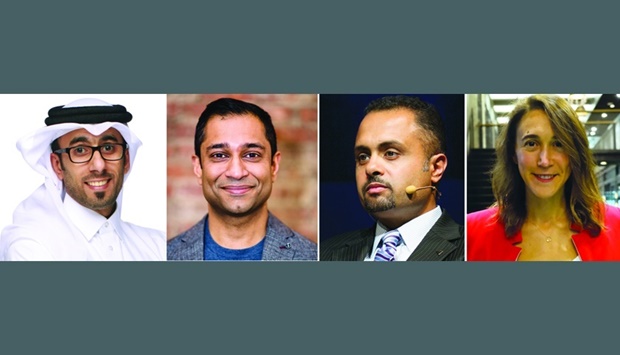These speakers included Dr Khalid M al-Ali, founder and CEO of STA; Khalid Aboujassoum, founder and CEO of Else Labs Inc; Fayez Mohamood, co-founder and CEO of Bluecore; and Melis Abacioglu, founder and CEO of Wellbees.
Moderated by Hind Zaki, QRDI’s director of RDI Programmes, the webinar attracted a mix of local, regional, and international audiences. The panellists provided an overview of their entrepreneurial journeys.
They offered analyses on how countries attract and retain talent while reflecting on what steps can be taken to reproduce successful innovation models in Qatar. The webinar concluded by noting Qatar's potential as a springboard for global innovative talent and entrepreneurial ventures.
The panellists began their entrepreneurial ventures in different parts of the world and described the factors influencing their decisions. Aboujassoum said he sought to be an entrepreneur in a place with existing capabilities. He initially moved to Silicon Valley, where he aimed to learn to build a company from the ground up.
However, he eventually moved to Canada to establish his company because it was both cost-effective and allowed him to tap into the available talent there. “As an entrepreneur, you have to make sure you're getting highly-skilled people while making sure you can survive as a startup,” he emphasised.
Entrepreneurs and businesses face difficulties in finding, acquiring, and retaining talent. Additionally, approaches to talent acquisition change at various stages of a business.
Mohamood said, “It’s somewhat easier in some markets to find talent that wants to build from scratch.” He pointed out that talent acquisition increased in difficulty as his business grew to pass the $1bn mark. However, his company kept an “open mind in terms of where [they] were able to recruit that talent.”
Abacioglu observed that “talent is looking for something completely different today.”
She said, “They're looking for meaning, for flexibility, and developing work environments that ensure well-being would accommodate both. Ultimately, innovation ecosystems that emphasise well-being would be more capable of attracting and retaining talent.”
The discussion showed the multifaceted nature of thriving innovation ecosystems. In addition to cost, talent, and environmental incentives, Mohamood stressed that innovation ecosystems need strong communities that focus on inspiration and “instilling that aspect of 'you can do it' anywhere in the world.” “Focus on inspiration so you can light up a generation,” he added.
Al-Ali spoke about his firsthand experience in California, where the state’s concerted long-term efforts through world-class educational and R&D institutions, steady and targeted government funding, and conducive legal and regulatory environments developed ecosystems, such as Silicon Valley.
He acknowledged Qatar Foundation was a key component of realising this potential in Qatar. He added that Qatar is a place where the long-term focus is on science, education, and health, and for it to have made the progress it has made is a mark of its leadership's ingenuity. “Qatar's innovation ecosystem is on the rise, and is a magnet attracting excellent talent,” he added.
The panellists agreed that Qatar's significant push and investment into its infrastructure and the development of an innovation ecosystem that fosters and grows talent have all yielded immense potential in a relatively short time. “There is a lot of untapped opportunities and potential that we can capitalise on [in Qatar],” said Aboujassoum, adding that Qatar should be a pilot hub for global unicorn

